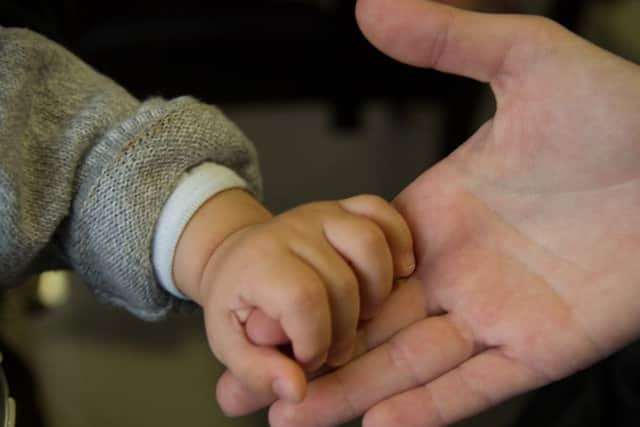Children should feel safe, cared for and loved


People from all walks of life can foster and while there are a lot of challenges involved, it is also very rewarding.
Foster carers can provide care in emergencies, for just a few days, a weekend or longer periods – until the child in care has reached the age of 21.
Advertisement
Hide AdAdvertisement
Hide AdThis year the Fostering Network is looking for 800 new families in Scotland to come forward and address a desperate need for more carers.


Across the UK more than 9000 fostering families are needed this year.
In particular, there is an ongoing and urgent call for more foster families to provide homes for teenagers, sibling groups, children with disabilities and unaccompanied, asylum-seeking children.
With too few foster families in Scotland, children are often placed many miles away from their family, school and friends, split up from brothers and sisters, or placed with a foster carer who does not have the right skills and experience to meet their specific needs.
Advertisement
Hide AdAdvertisement
Hide AdThere is then a significant risk that a child’s placement will break down, which means they move home again, adding to the loss and trauma experienced in their young lives.


Figures show that two in five (40 per cent) fostered teenagers are already living with their third foster family since coming into care.
And one in 20 (five per cent) teenagers are living with their tenth family in foster care.
With a rising number of children coming into care, and around 12 per cent of foster carers retiring or leaving fostering last year, there is a need to not only recruit more foster carers, but to make better use of the current pool of foster carers to meet the needs of the young people involved.
But who can foster?
Advertisement
Hide AdAdvertisement
Hide AdThe answer is almost anyone can apply. You can be single, married or have a partner; you can be a parent already or have no children of your own; you can be claiming benefits or be in work; you don’t need any formal qualifications and you can apply from the age of 18, although some fostering services will have higher limits. You can also own your own house or rent, as long as it’s stable.
In most cases, however, potential foster carers need to have a spare room.
Sara Lurie, director of the Fostering Network in Scotland, said: “No child comes to foster care through any fault of their own – for some children they’re not able to be looked after by their mum or dad, no matter how much they might love them.
“Due to often sad and tragic circumstances, these children require the love and care of a foster family.
Advertisement
Hide AdAdvertisement
Hide Ad“We want Scotland to be the very best place for all children to grow up, and this means that for any child who is not able to live with their own birth family they still have the opportunity to experience normal family life.
“All children should feel safe, cared for, loved, understood and believed in.
“Foster carers give children this opportunity.”
She continued: “People who foster children tell us how rewarding it is for them and their families.
“Yes, there are a lot of challenges but it can also be fun and there is a lot of love.
Advertisement
Hide AdAdvertisement
Hide Ad“One of the most rewarding things about being a foster carer is seeing the children grow and develop into responsible adults.
“The work of foster families contributes not only to society now but in the future as young people who live with foster carers grow up with a more positive future ahead.
“By recruiting more foster carers we can provide a wider pool of potential foster families so that every time a child needs a foster family, they have the best chance of finding the one which best meets their individual needs.”
Once someone decides to make a formal application to foster, they will be assessed and given initial training.
Advertisement
Hide AdAdvertisement
Hide AdThis pre-approval process will prepare the individual and other members of the household for fostering.
The assessment includes background checks as well as personal and professional referees.
Once this is complete a report will go before a fostering panel which then makes a recommendation.
Sara said: “Following approval as a foster carer, there is a range of ongoing support and training from their fostering service and The Fostering Network.”
Advertisement
Hide AdAdvertisement
Hide AdThe Fostering Network calculates recruitment targets every year, taking into account the percentage of the foster carer workforce leaving and the rise in the number of children in care.
Some 5533 children are living with more than 4450 foster families across Scotland each day.
Sara added: “We would encourage everyone who is keen to learn more about fostering to visit couldyoufoster.org.uk, find their local fostering service, and contact them to find out whether they can foster a child.”
Case study
Morag Milne has been a foster carer since 2011 and specialises in caring for younger children.
Advertisement
Hide AdAdvertisement
Hide AdShe said: “I have fostered seven children over the past five years for various amounts of time.
“Sometimes the children only stay a week or two while other youngsters stay for a couple of years.
“I have mainly fostered younger children – some of them were sibling groups of two.”
Each carer is approved for a specific amount of children and a specific age range.
Advertisement
Hide AdAdvertisement
Hide Ad“I thought about it for a while,” said Morag. “I really wanted to make a difference to a child who maybe hadn’t had the best start in life.
“Every child deserves a safe environment to grow up in and to receive love and respect enabling them to achieve their potential.
“Like any job it has its ups and downs and it can be challenging when a new child arrives and you have to get to know each other.
“For me, the rewards are seeing the children I am looking after flourish into happy, confident individuals.
Advertisement
Hide AdAdvertisement
Hide Ad“It’s also rewarding to see the children move into adoption, kinship care or go back home and know that I have helped to make that possible.”
Barnardo’s Scotland Fostering is also issuing a plea for foster carers.
Barnardo’s Scotland Fostering is issuing a plea for would-be-foster carers and adopters to give children and young people the stable, loving care they deserve.
The appeal follows the launch of the children’s charity foster and adoption recruitment campaign.
Advertisement
Hide AdAdvertisement
Hide AdLaura Hadley-Stove, Barnardo’s Scotland Fostering West service manager, said: “Our foster carers and adopters are changing children and young people’s lives for the better.
“You don’t have to be a superhero, you just need to be able to offer the loving care they need.”
Siobhan Carroll, Barnardo’s Scotland assistant head of business, said changes included in the Children and Young People (Scotland) Act 2014 (which became law in March 2014) are due to come into force this April. The Act will introduce continuing care – an entitlement for young people to stay in a care placement up to the age of 21.
She said: “Barnardo’s Scotland campaigned for this change and fully backs it. It does, however, mean that young people could stay in foster placements for longer, so the need for foster carers will increase.”
To find out more about fostering or adoption contact Barnardo’s foster care or adoption team. Call Freephone 0800 0277 280 or visit www.barnardos.org.uk/fosteringandadoption.